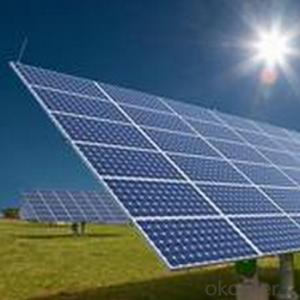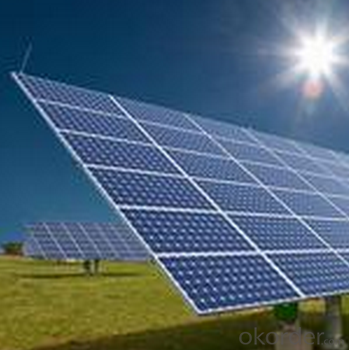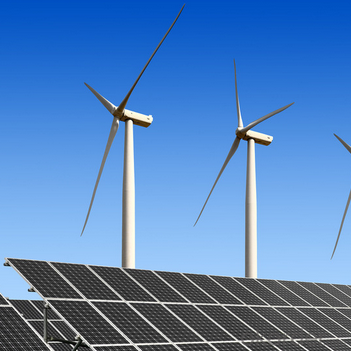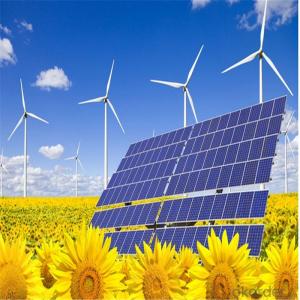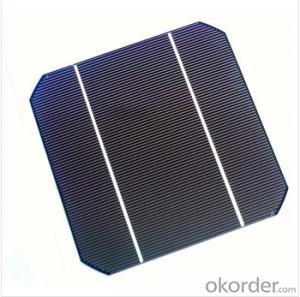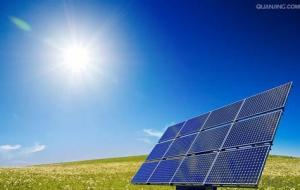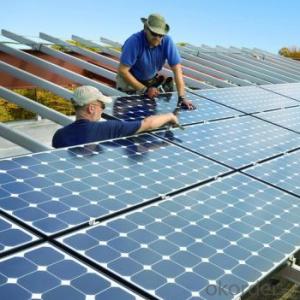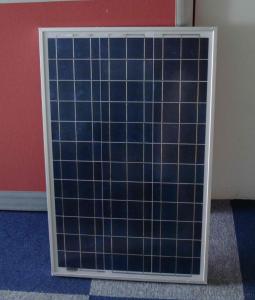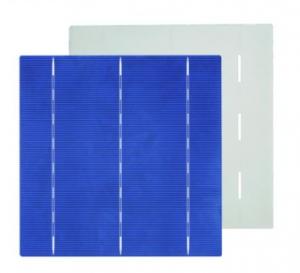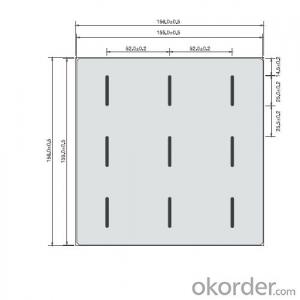Cesium Solar Cells High Efficiency 250W Mono Solar Module Ice-6
- Loading Port:
- China main port
- Payment Terms:
- TT OR LC
- Min Order Qty:
- 200 watt
- Supply Capability:
- 50000 watt/month
OKorder Service Pledge
OKorder Financial Service
You Might Also Like
Instruction
1. Low voltage-temperature coefficient allows higher power output at high-temperature condition.
2. High efficient, high reliable solar cells ensure our product output stability.
Feature
1. Manufactured in an ISO9001:2008 certified plant
2. High efficiency, high safety, high reliability
3. Output power tolerance of +/-3%
Images
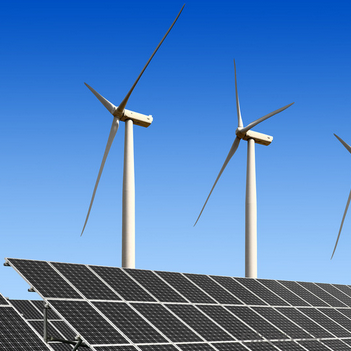
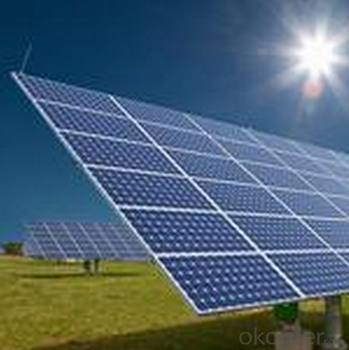
Specification
| team | detail 1 | working conditon | detail 2 |
| cell | 156' 156mm | max system votage | 1000 votage |
| weight(kg) | 19.5 | operating temp | -40°C~+85°C |
| Cable Length(mm) | ≥1000 | Static loading | ≥2400Pa |
| Dimensions(LxWxH)(mm) | 1650*990*40 | Maximum Series Fuse (A) | 13 |
| No. of cells and connections | 60(10x6) | NOCT | 45±2°C |
| Cable cross section size | 4mm2 | Grounding conductivity | ≤0.1Ω |
| No. of diodes | 6 | Application Class | Class A |
| Packing configuration | 25pcs/carton | Insulation Resistance | ≥100MΩ |
FAQ
1.Reply your inquiry in 24 working hours
2.Customized design is available, OEM is welcomed
3.Delivery the goods to our customer all over the world with speed and precision
4.Offer the customer the lowest price with high quality solar modules
- Q: Can solar cells be used in transportation?
- Yes, solar cells can be used in transportation. Solar-powered vehicles and boats have been developed, and solar cells can be used to power various components in electric vehicles such as charging stations, auxiliary systems, and even directly powering the vehicle itself. However, the efficiency and cost of solar cells still pose challenges for widespread adoption in transportation.
- Q: Can solar cells be used in residential communities?
- Yes, solar cells can be used in residential communities. They are a sustainable and renewable energy source that can be installed on rooftops or in open spaces to generate electricity for individual homes or shared community buildings. Solar energy can help reduce reliance on grid-supplied electricity, lower energy bills, and contribute to a cleaner and greener environment. Additionally, advancements in solar technology have made it more efficient and cost-effective, making it an increasingly popular option for residential communities.
- Q: What is the role of inverters in solar cell systems?
- The role of inverters in solar cell systems is to convert the direct current (DC) generated by the solar panels into alternating current (AC) electricity that can be used to power homes and businesses, or be fed back into the electrical grid. Inverters ensure efficient and reliable energy conversion, enabling solar energy to be used effectively as a renewable source of power.
- Q: What is the typical warranty for solar cells?
- The typical warranty for solar cells usually ranges from 10 to 25 years.
- Q: What is the environmental impact of manufacturing solar cells?
- The manufacturing of solar cells has both positive and negative environmental impacts. On the positive side, solar cells generate clean and renewable energy, reducing the reliance on fossil fuels and thereby decreasing greenhouse gas emissions and air pollution. Additionally, solar cells have a long lifespan and require minimal maintenance, reducing the overall environmental impact compared to other energy sources. However, the production process of solar cells does have some negative environmental consequences. The extraction of raw materials, such as silicon and rare earth metals, can lead to habitat destruction, water pollution, and soil degradation. The manufacturing process also requires energy and water, which can contribute to carbon emissions and water scarcity if not managed efficiently. Overall, while the production of solar cells does have some environmental impacts, it is important to consider them in relation to the significant environmental benefits that solar energy provides in terms of reducing carbon emissions and mitigating climate change.
- Q: What is the role of bypass diodes in solar cell systems?
- The role of bypass diodes in solar cell systems is to prevent the loss of power due to shading or damage to individual solar cells. These diodes provide an alternate pathway for the flow of current, allowing the unaffected cells to continue generating electricity even if some cells are blocked or not functioning optimally. By minimizing the impact of shading or cell failure, bypass diodes help to maintain the overall efficiency and performance of the solar cell system.
- Q: Can solar cells be used in water purification systems?
- Yes, solar cells can be used in water purification systems. Solar cells can generate electricity from sunlight, which can power various components of water purification systems such as pumps, filters, and disinfection processes. This enables the system to operate independently from the grid, making it suitable for remote or off-grid locations. Additionally, solar energy is a clean and sustainable power source, aligning with the environmentally-friendly nature of water purification processes.
- Q: How do solar cells affect the aesthetics of a building?
- Solar cells can have both positive and negative impacts on the aesthetics of a building. On one hand, solar cells can be integrated into the design of a building in a way that enhances its visual appeal. They can be sleek and modern, adding a contemporary touch to the structure. Additionally, solar panels can be installed on flat roofs or as part of shading devices, blending seamlessly with the overall architecture. However, solar cells can also be seen as an eyesore, especially if they are installed in an unattractive or haphazard manner. The presence of bulky panels on the roof or facade of a building may be considered visually disruptive and can detract from the building's overall aesthetics. In summary, the impact of solar cells on a building's aesthetics depends on their design, placement, and integration. With thoughtful planning and execution, solar cells can actually enhance the visual appeal of a building, but careless installation may have the opposite effect.
- Q: Can solar cells be used for powering traffic lights?
- Yes, solar cells can be used for powering traffic lights. Solar panels can generate electricity from sunlight, which can then be stored in batteries and used to power traffic lights without the need for a traditional electrical grid connection. This is an environmentally-friendly and cost-effective solution for powering traffic lights in areas where it may be challenging to provide a constant power supply.
- Q: What is the average cost of a solar cell?
- The average cost of a solar cell varies depending on factors such as the type of cell, its efficiency, and the size of the installation. However, as of 2021, the average cost is approximately $0.30 to $0.40 per watt for residential installations and $0.20 to $0.30 per watt for utility-scale installations. It's important to note that these costs have been decreasing over the years due to advancements in technology and increased adoption of solar energy.
Send your message to us
Cesium Solar Cells High Efficiency 250W Mono Solar Module Ice-6
- Loading Port:
- China main port
- Payment Terms:
- TT OR LC
- Min Order Qty:
- 200 watt
- Supply Capability:
- 50000 watt/month
OKorder Service Pledge
OKorder Financial Service
Similar products
Hot products
Hot Searches
Related keywords
